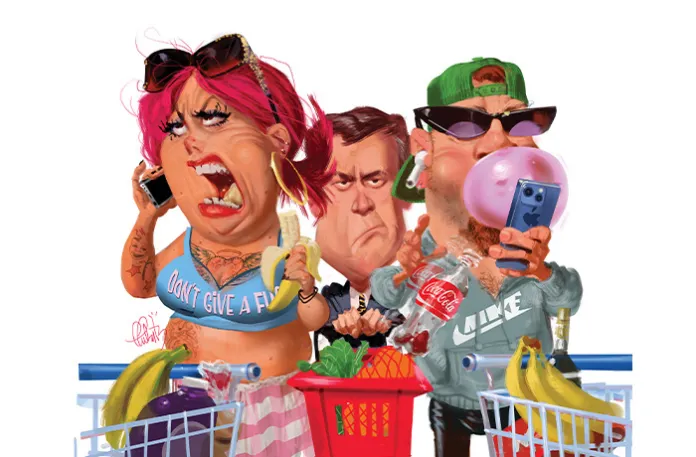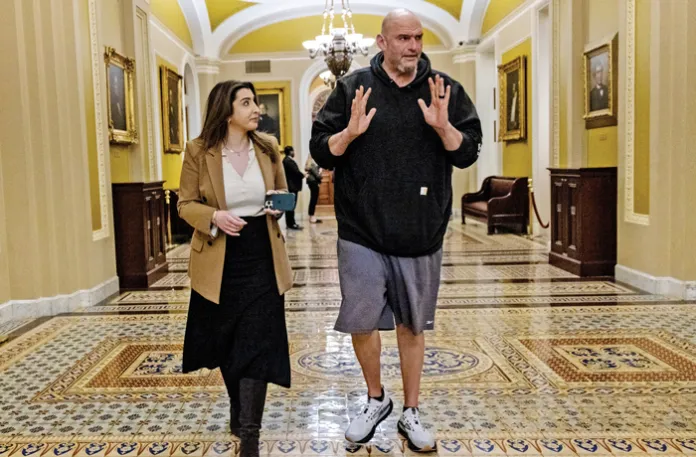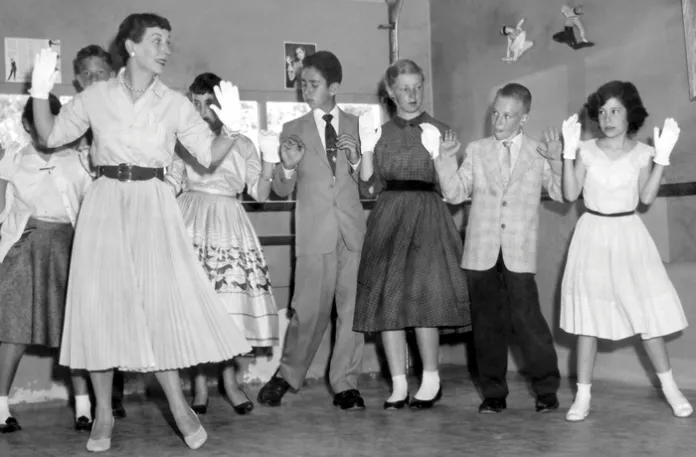Growing up, I was not educated by nuns, raised by particularly stern parents, or compelled to commit to memory the collected works of Emily Post. Even so, I knew that a gentleman ought to open a door for a lady, exercise restraint in using colorful language, and write a thank-you note upon receiving a gift. I was raised in a household, and came of age during a civilizational moment, that still prized good manners, or at least their outward display, which is better than nothing.
Alas, that moment is very far from our own. On a daily basis, we are blasted by ample examples of crassness, curtness, and all-around disagreeableness. Granting the fact that these faults are common to humanity in all times and places, few could argue with the proposition that life in 2025 has been unusually and needlessly coarsened. Drivers on the road rev their engines menacingly, passersby on the sidewalk glare bad-naturedly, and previously unutterable language has found its way onto TV — it’s bleak out there.
Consider an ordinary chore such as going to the grocery store, which, in the third decade of the 21st century, has become a study in the veracity of The Fall. In my experience, many shoppers have a sketchy sense of being engaged in a communal activity. Grocery shopping has become Exhibit A for the proliferation of the ethos of Black Friday throughout the year: lots of people, little patience, and abundant cart clanging. Few say “excuse me” when reaching for their six-pack of soda or pallet of peanut butter eggs. In fact, it is rare for shoppers to say anything at all, at least to their fellow shoppers, since many are ceaselessly involved with their phones. Some merely scroll, but others carry on conversations oblivious to the humans around them. More than once, I have looked up as though I was being addressed, only to find that an adjacent customer was in an argument with someone miles away. The pleasure of chatting up someone in produce or dairy is quickly becoming obsolete. Is not indifference the first step toward rudeness? When I offer some minor kindness to a fellow customer — say, letting them step ahead of me in line or apologizing for walking past them — they often have no reaction or are mildly shocked, as though my behavior is that of an alien from a planet that still practices chivalry.

The scrum at the self-checkout lane is no better. Where I shop, most people self-file into an orderly line, but the workers tasked with monitoring the customers have a job that shares some features with that of a prison guard. If, heaven forbid, a shopper places an oversized item — say, a package of paper towels — directly into his or her cart, one of the guards (er, employees) will inevitably bound over to review the camera footage documenting that said item has been scanned. I know of stores that check shoppers’ receipts before they depart, something that can be defended practically amid rampant shoplifting but can never be excused spiritually. Recall the admonition of that icon of midcentury liberalism Edward R. Murrow: “We will not walk in fear, one of another.” Civic trust has given way to legalism.
Perhaps I am making too much of a trip to the grocery store, but does it not matter that many seem to care so little about making a good impression? For someone to want to make a good impression suggests that they care enough about others to care what others think of them. But when people care only about their convenience — for example, getting into and out of a shopping destination as quickly as possible — it is a sign that they only care about themselves. This can express itself in many ways, but one of the most visible is when a person dresses in a manner that makes the least possible demands of his or her time and effort.

With depressing regularity, I encounter adults wearing, depending on the season (or not), shorts, T-shirts, and hoodies, which suggests not only that the wearers prize comfort but that they also actively disvalue everyone around them. To dress appropriately is not a selfish but a selfless exercise. Most restaurants and stores still insist on dress codes, however tacky, for their employees because they realize that slovenly workers suggest a lack of regard for their customers. It is not just the sloppy dresser who is brought low by his sloppiness but everyone around him: When I see a man donning sandals in the dead of winter, or a woman wearing what appear to be pajamas at 5 o’clock in the afternoon, I find myself personally offended — because, in their carelessness, they are implicitly exhibiting hostility toward anyone who puts care into how they look. Dressing this way is a statement against all the non-lazy dressers. This tendency became worse during the pandemic, when all things good and decent were sacrificed in the name of “staying safe.” Of course, face masks would ruin any outfit, so the slobby among us were given a pass for their crimes against fashion because they were allegedly serving the greater good.
In fact, the decline in manners and dress can be traced to a virus of self-centeredness that may have reached its apex during the pandemic — when self-preservation trumped community, fraternity, and courtesy — but is, minute by minute, exacerbated by social media. These platforms not only distract their users from normal interactions, as is the case when grocers scroll instead of shop, but also deaden their ability to engage in such interactions. If a person spends hours posting abusive or hostile comments about co-workers, celebrities, or politicians (or reading co-workers, celebrities, or politicians doing the same), how can that person be expected to turn down the volume and have an indignation-free conversation with his or her neighbor? The internet depends upon the expression of uninhibited opinions, but polite society depends upon the suppression of such opinions — to withhold judgment, to bite one’s lip, and to listen and nod without replying in kind. Unfortunately, a generation has been raised, and earlier generations have been trained, to carry their online behavior into real life, in which the instincts behind shock humor, mean tweets, and instant outrage are, generally speaking, crimes against decency.

Of course, one cannot overlook the fact that we have, for over a decade, lived with a major political figure who is “extremely online”: President Donald Trump. There is no question that Trump’s more unhinged-sounding pronunciamentos and taunts, and insistence on reducing public figures to such names as “Lyin’ Ted” and “Sleepy Joe,” have moved the needle on what’s permissible, even in the minds of his adversaries. When then-House Speaker Nancy Pelosi (D-CA) ripped to shreds her written copy of Trump’s State of the Union address, or when Gov. Gavin Newsom (D-CA) attempts to conscript Trump’s overripe tweeting style, Democrats are “normalizing” Trump in the manner that they have long cautioned Republicans against. In the end, Trump’s greatest sin may be in mainstreaming the idea that offensiveness is a sustainable posture in public life.
Yet it can never be a sustainable posture in our lives. It is fun and liberating to listen to Joe Rogan, Greg Gutfeld, and Dave Chappelle — as it is, for their respective fans, to listen to Trump or Newsom — but it should be possible to enjoy these figures while acknowledging that what they do is best left to professionals. The proper response to Trump’s rough-and-tumble manner could be to laugh, cautiously applaud, and perhaps occasionally wince, but it should not be to give ourselves license to follow his lead. This is not pearl-clutching but reality. Let us recall the sage advice of our mothers: “If your friend jumped off a bridge, would you?”
Maybe mothers are the key to this. My mother regarded it as her duty not to be my friend but to provide instruction on how to get through life with some dignity and decency. To this day, I remember things that my mother told me to do and not to do, including: to return but never initiate a woman’s handshake; to, when walking with a woman on a sidewalk, occupy the space nearest to the street; to give leeway to the caller to terminate a phone conversation; and to make liberal use of words like “please,” “thank you,” “may I” rather than “can I,” and so on. For the last half-decade or so, we seem to have been compelled to learn best practices surrounding various pronouns, but I had my own set of pronoun rules learned in childhood: I was told that it was the height of rudeness to refer to a family member using a pronoun — in other words, to speak of my mother using “she” or “her,” or of my father using “he” or “him.” I was taught to take pride in looking someone in the eye, in wearing a coat and tie, and in speaking well of a friend, acquaintance, stranger, or outright enemy.

I was born in 1983, and while it is easy to contort the past in service to misty-eyed memories, I do not think I am mistaken in my characterization of the years of my childhood as being more genteel. I did not encounter great resistance to the lessons I learned at home. The antecedents to the MAGA movement were rightly ready to oust George H.W. Bush for Pat Buchanan, but can anyone question that, as a national tone-setter, the decorous and modest 41st president had a salutary effect on the national character? Of course, the ’80s were full of self-indulgence and excess — these were, after all, also the years of Madonna, Wall Street, and The Art of the Deal — but somehow the center held: Dad was likely to have a job that required a suit (or some form of company-mandated dress), Mom had sway over household rules, the children were made to dress up for church, family get-togethers, and the photo session at Sears. These values sometimes made their way to the big screen in more or less uncorrupted form: In the original Ghostbusters movie, Bill Murray declines to open his containment facility to the representative from the Environmental Protection Agency because the fellow failed to say “the magic word” — that word being “please.”
I was not perfect, but an air of polite convention governed my household and, as near as I could see, the households of virtually everyone I knew. None of my friends would have cussed, been openly disobedient or defiant, or consistently (or persistently) ill-mannered unless they sought disciplinary action from parental figures. Things like tattoos, drug use, and premarital living arrangements were considered way, way outside the norm — the habits of ruffians, not of ladies and gentlemen.

I do not doubt that others had different experiences, and I do not deny that such customs are always on the verge of decay or transformation. Yet this proves my point: That The Simpsons, which I remember as a rather controversial show in its early seasons for its implicit irreverence toward the family unit, could exist within an overall atmosphere of rectitude shows how resilient those things can be. In fact, my parents were quite liberal in letting me read and watch what I wished, including The Simpsons. They reckoned it was unlikely that I would imitate bad behavior because I had been so well indoctrinated in good behavior — that I could distinguish between fiction and reality, in other words.
SYDNEY SWEENEY GOES WESTERN IN ‘AMERICANA’
Growing up, I remember flipping through a book given to my mother shortly after she married my father, then an Air Force officer: What Every Air Force Wife Should Know. Much of the book is applicable only to someone in her peculiar station at that time, the newlywed wife of a serviceman, but, looking at it again today, I can see where she picked up much of the ethos by which she lived. “Civilian friends and neighbors may judge the Air Force by your actions,” the book read. “Do not give them reason for criticism or censure.” Other advice included: “Make it a rule not to gossip since it is a dangerous practice and can do far-reaching damage.” And: “Loud talking and gum chewing are particularly unbecoming to a woman and should be avoided.” And: “Wear your hat and gloves when in doubt; you can always remove them if they are out of place.”

Of course, some of these rules will sound antiquated or silly. Perhaps my mother made too much of women who conspicuously chew gum, and maybe I object too strenuously to people who dress in hoodies and PJs. But a censorious attitude about such things serves as a check on our lassitude, fecklessness, and selfishness. If the old edicts were honored, we would look better and get along with each other better. This is something the Left and the Right should agree upon. On Jan. 6, 2021, when I watched on TV the vast lawlessness that had overtaken the Capitol, my first thought was not that I was watching an insurrection but that I was watching the consequence of decades of failing to teach the lessons of What Every Air Force Wife Should Know and similar books outlining good behavior. In other words, the Capitol fracas was, at minimum, an example of what happens when society abandons its standards. People properly catechized in good manners, who cared about the impression they were leaving, would simply never have entered the Capitol. The same is true of the vile left-wing protests that preceded the events of Jan. 6 during the so-called “Summer of Love.” If a man does not know enough to wear a cummerbund, he will not know enough to refrain from putting his shoes on Pelosi’s desk — a final, apocalyptic manifestation of the bad, bad manners that have long been creeping up all around us.
Peter Tonguette is a contributing writer to the Washington Examiner magazine.
